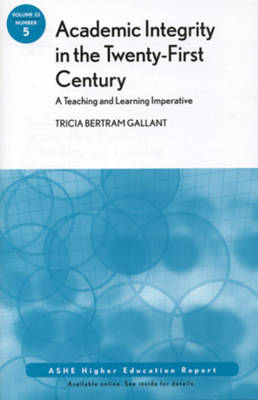J-B ASHE Higher Education Report Series (AEHE)
1 total work
Academic Integrity in the 21st Century: A Teaching and Learning Imperative
by Tricia Bertram Gallant
Published 5 August 2008
Tricia Bertam Gallant, academic integrity coordinator for the University of California, San Diego considers the issue of academic misconduct in the context of the complex forces currently straining the teaching and learning environment. She proposes a new perspective that calls for campuses to shift from asking "How do we stop students from cheating?" to "How do we ensure students are learning?" The alternative teaching and learning strategy outlined here positions student academic integrity at the center of a new perspective on teaching and learning, one that is gaining ground in contemporary educational institutions. Academic misconduct is a longstanding problem, one that unfortunately has not simply disappeared with the advent of the twenty-first century. Much has been written about the integrity of undergraduate academic work, but little has changed--higher education still responds to reports of student cheating by institutionalizing methods to prevent, police, and punish, and academic misconduct continues to exist in colleges and universities. This monograph from the ASHE Higher Education Report series offers an innovative approach to breaking the cycle.
This is the fifth issue in the 33rd volume of the Jossey-Bass series ASHE Higher Education Report. Each monograph in the series is the definitive analysis of a tough higher education problem, based on thorough research of pertinent literature and institutional experiences. Topics are identified by a national survey. Noted practitioners and scholars are then commissioned to write the reports, with experts providing critical reviews of each manuscript before publication.
This is the fifth issue in the 33rd volume of the Jossey-Bass series ASHE Higher Education Report. Each monograph in the series is the definitive analysis of a tough higher education problem, based on thorough research of pertinent literature and institutional experiences. Topics are identified by a national survey. Noted practitioners and scholars are then commissioned to write the reports, with experts providing critical reviews of each manuscript before publication.
